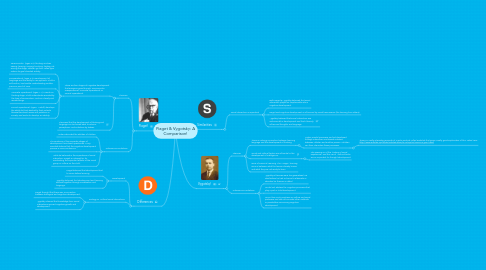
1. Piaget!
1.1. Theories
1.1.1. There are four stages of cognitive development that everyone goes through: Sensorimotor, Preoperational, Concrete Operational, & Formal Operational.
1.1.1.1. Sensorimotor: (ages 0-2), thinking involves seeing, hearing, moving, touching, tasting, etc. During this stage, children go from reflex-type actions to goal-directed activity.
1.1.1.2. Preoperational: (ages 2-7), Development of language and the ability to use symbols. Child is self-centric; has trouble understanding another person's point of view.
1.1.1.3. Concrete Operational: (ages 7-11), Hands-on thinking stage. Child understands reversibility, the laws of conservation, and can classify and seriate things.
1.1.1.4. Formal Operational: (ages 11-adult), develops the ability to think abstractly, think outside themselves about issues and problems in society, and works to develop an identity.
1.1.2. Theorized that the development of thinking and language can be traced back to actions, perceptions, and imitations by babies.
1.2. Criticisms & Limitations
1.2.1. Under-estimated the abilities of children
1.2.2. The existence of four separate stages of development have been questioned. Many scientists believe that the cognitive development process is more continuous.
1.2.3. While he believed in the importance of social interaction, Piaget is criticized for for overlooking the important effects of the social group or culture on the child.
2. Differences
2.1. Development
2.1.1. Piaget believed that development had to come before learning.
2.1.2. Vygotsky believed that development and learning worked together through socialization and language.
2.2. Biology vs. Culture/Social Interactions
2.2.1. Piaget thought that there was a connection between biological and cognitive development.
2.2.2. Vygotsky claimed that knowledge from social interactions spurred cognitive growth and development.
3. Similarities
3.1. Social interaction is important!
3.1.1. Both Piaget & Vygotsky believed that social interaction played an irreplaceable role in cognitive development.
3.1.2. Piaget said cognitive development is influenced by social transmission (the learning from others).
3.1.3. Vygotsky believed that social interaction was instrumental in development and that it heavily influenced thoughts and language.
4. Vygotsky!
4.1. Theories
4.1.1. There is a strong connection between learning language and the development of thinking.
4.1.1.1. Higher mental processes are first developed through interaction and shared activities between children and another person. Children can then internalize these processes.
4.1.1.1.1. There is a really interesting episode of a radio podcast called Radiolab that gives a really good explanation of this. Listen here: http://www.radiolab.org/blogs/radiolab-blog/2010/sep/07/voices-in-your-head/
4.1.2. Social and cultural factors are influential in the development of intelligence.
4.1.2.1. The passing on of the "history of social experience" and the use of "cultural tools" are an important for thought development.
4.1.3. Zone of Proximal Learning. The "magic" learning zone in between what the learner already knows and what they are not ready to learn.
4.2. Criticisms & Limitations
4.2.1. Vygotsky's theories were too generalized. He died before he had a chance to elaborate or describe his theories in detail.
4.2.2. He did not address the cognitive processes that play a part in child development.
4.2.3. He put too much emphasis on culture and social processes and did not consider other methods or possibilities concerning cognitive development.
